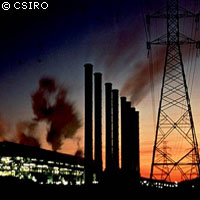Atmospheric CO2 levels rising faster than expected
Levels of carbon dioxide (CO2) in the atmosphere have increased faster than expected during the past few years, according to an international team of scientists. The researchers, whose work was partly funded by the EU, attribute the sharp rise in CO2 levels to three factors. 'Since 2000, a growing global economy, an increase in the carbon emissions required to produce each unit of economic activity, and a decreasing efficiency of carbon sinks on land and in oceans have combined to produce the most rapid seven-year increase in atmospheric CO2 since the beginning of continuous atmospheric monitoring in 1959,' the researchers explain in their paper in the Proceedings of the National Academy of Sciences of the USA (PNAS). The growth of the world economy accounts for 65% of the acceleration in the CO2 levels of the atmosphere, states the paper, with the other two factors each accounting for half of the remaining 35%. However, it is these other two factors - the carbon intensity of the economy and the weakening carbon sinks - which are of particular concern. The scientists note that until recently, the carbon intensity of the economy, which refers to the amount of CO2 emitted per economic unit, was improving. The carbon intensity of the gross world product fell from 0.35 kg of carbon per dollar in 1970 to 0.24 kg of carbon per dollar in 2000. Almost all scenarios for future emissions assume that this improvement will continue well into the future. The researchers reveal that since 2000, the carbon intensity of the economy stopped improving and started to deteriorate at a rate of 0.3% per year. They warn that this trend, coupled with rapidly rising emissions, 'amplifies the challenge of stabilising atmospheric CO2'. The third factor contributing to the sudden rise in CO2 levels is the declining efficiency of the world's natural carbon sinks. 'The proportion of carbon dioxide remaining in the atmosphere after vegetation and the oceans absorb what they can has escalated over the past 50 years, showing a decrease in the planet's ability to absorb anthropogenic emissions,' explained Dr Pep Canadell, the study's lead author and Executive Director of the Global Carbon Project. 'Fifty years ago, for every tonne of CO2 emitted, 600kg were removed by natural sinks. In 2006 only 550kg were removed per tonne and that amount is falling.' Half of the decline in the efficiency of the oceanic carbon sink is due to changes in the westerly winds in the Southern Ocean, which are themselves driven by human activities. On land, a series of droughts in 2002 to 2005 contributed to a weakening of the terrestrial carbon sinks in many regions. 'The carbon cycle is generating stronger-than-expected and sooner-than-expected climate 'forcing' - that is, mechanisms that 'force' the climate to change,' explained Dr Mike Raupach of Australia's Commonwealth Scientific and Industrial Research Organisation. 'In turn, climate change itself is feeding back to affect the carbon cycle, decreasing land and ocean sinks.' 'The decline in global sink efficiency suggests stabilisation of atmospheric CO2 is even more difficult to achieve than previously thought,' added Dr Corinne Le Quéré of the University of East Anglia and the British Antarctic Survey. According to Dr Raupach, the new results underline the urgency of bringing global CO2 emissions under control. 'We have found that the Earth is losing its restorative capacity to absorb CO2 emissions in the face of the massive increases in emissions over the last half century. The longer we delay reducing emissions, the more restorative capacity will be lost,' he warned. EU funding for the study came from the Sixth Framework Programme (FP6) CARBOCEAN and CARBOEUROPE projects.



